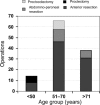Consenting for pelvic nerve injury in colorectal surgery: need to address age and gender bias
- PMID: 20487592
- PMCID: PMC3180310
- DOI: 10.1308/003588410X12628812459779
Consenting for pelvic nerve injury in colorectal surgery: need to address age and gender bias
Abstract
Introduction: Pelvic nerve injury is a recognised complication following pelvic dissection in colorectal surgery. It can lead to urinary and sexual dysfunction in men and women, which varies from 5-40% depending on the surgery and the underlying pathology. Sexual dysfunction can manifest as erectile dysfunction in men and as dyspareunia and failure to achieve sexual arousal/orgasm in women. The aim of this study was to evaluate consent for these complications prior to surgery.
Patients and methods: We carried out a retrospective audit on patients who had undergone elective colorectal surgery involving pelvic dissection over a 2-year period (June 2006 to June 2008) at University Hospital of North Staffordshire. We reviewed the consent forms and medical records of these patients, specifically looking for documentation of pelvic nerve injury, sexual dysfunction or erectile dysfunction prior to surgery. Only patients who had documented pelvic dissection in their operative notes were included in the audit, and those who were deemed unable to consent were excluded.
Results: Medical records of 118 patients were reviewed. Of this cohort, 31% were women (n = 37). Malignancy was the indication for surgery in 79% of women and 88% of men. Consent for the procedure was obtained by a consultant in 73% (n = 86) of patients and by a middle-grade surgeon in the remaining 27% (n = 32). Only two women were consented for pelvic nerve injury whilst this number was 41 for men (5% vs 51%). Patients younger than 50 years were more consistently informed of the risks (50%) compared to the over 50-year-olds (34%). Only eight patients (males 6, females 2) were consented for urinary dysfunction.
Conclusions: The risk of pelvic nerve injury is not frequently stated, which is more common in women and the elderly. Overall, only 36% of patients were consented for pelvic nerve injury, while only 5% of women were consented. Is this professional discretion, or evidence that surgeons are not being assiduous enough when obtaining consent, which may leave them vulnerable to medicolegal claims? Introduction of procedure-specific consent forms would be a method to address this issue.
Figures
References
-
- Cancer Research UK. UK Bowel Cancer Incidence Statistics. < www.info.cancerresearchuk.org/cancerstats/types/bowel/incidence>.
-
- Gruner OP, Naas R, Fretheim B, Gjone E. Marital status and sexual adjustment after colectomy. Results in 178 patients operated on for ulcerative colitis. Scand J Gastrol. 1977;12:193–7. - PubMed
-
- Keating JP. Sexual function after rectal excision. Aust NZ J Surg. 2004;74:248–59. - PubMed
-
- Fazio VW, Fletcher J, Montague D. Prospective study of the effect of resection of the rectum on male sexual function. World J Surg. 1980;4:149–52. - PubMed
MeSH terms
LinkOut - more resources
Full Text Sources


